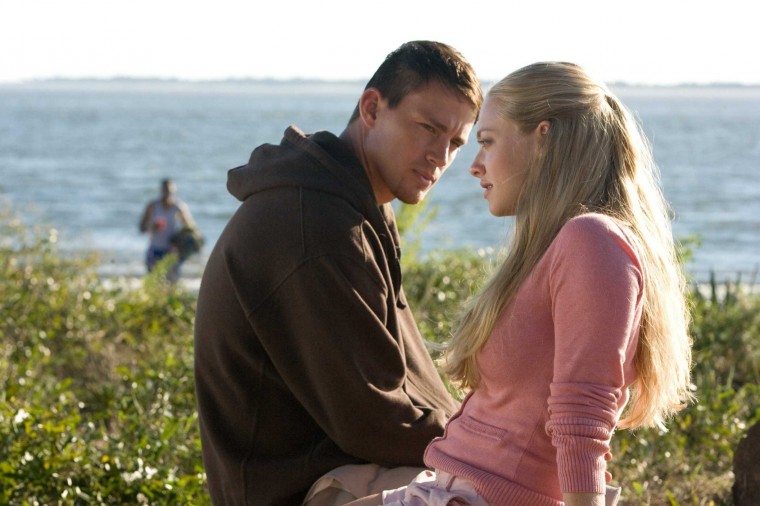
Channing Tatum (left) and Amanda Seyfried play a couple separated by war in director Lasse Hallström’s Dear John.
There is a fine line between style and repetition in the romantic fiction genre.
Dear John tells the love story of Savannah Curtis (Amanda Seyfried, Jennifer’s Body) and John Tyree (Channing Tatum, G.I. Joe: The Rise of Cobra) over the course of five years where their primary form of communication is through written letters. Those familiar with author Nicholas Spark’s other stories (such as The Notebook and A Walk to Remember) are used to his dramatic tools, but this time it seems as if there is nothing left in the shed.
In his latest movie adaptation, the sappy story relies on death, disease and separation to drag emotions out of the cliché script. However, these are the instruments of a romance novelist for a reason: They will affect the entire audience.
But you already know how you will react to Dear John — the same as you would react to any romantic fiction, with a cynical smirk or a stream of tears.
The couple meets when John leaps off a dock to retrieve Savannah’s purse. Naturally, the purse is sitting neatly at the bottom of the ocean surrounded by an adorable school of minnows, and he’s able to find it easily while swimming in the crystal blue water. After a quick exchange of names, John is promptly invited back to Savannah’s beach mansion for a cold beer. They bond over barbeque and the moon before proceeding to have two magical weeks filled with charity work and the Carolina shore, spending every second together.
The match is intended to surprise the audience, as they are a pair no one expects to fall hopelessly in love. John, the tough military loner, and Savannah, the idealistic college student, represent an exhausted staple of romantic films.
Despite their obvious love for each other, they are not a perfect couple. Their first argument erupts the day before Savannah leaves for college, resulting in John beating up three guys in three seconds with three punches. It is quickly forgotten, of course, when Savannah stops by his house for their regular lasagna dinner before she leaves for school.
Although the characters are one-dimensional, both Tatum and Seyfried play the roles well. Tatum’s macho man demeanor appeals to the female-targeted audience, and he delivers the sappy lover’s lines in a genuine way. Seyfried plays the Southern belle with charm and stereotypical female vulnerability.
Director Lasse Hallström (Hachiko: A Dog’s Story) does an especially beautiful job depicting the lush and lazy Wilmington, N.C. The town appears to be stuck in time, a modernized version of the typical, glamorized Old South. One of the film’s greatest attributes is the sharp contrast between Savannah’s world of North Carolina, the place where she and John fell in love, and John’s gritty, dusty Army station. John’s setting is raw, yet lacks any truly violent scenes (and is thus perfectly tailored to most women). This contrast also emphasizes the distance between the two and contributes to any sympathetic feelings the audience has for the pair.
Surprisingly, a sub-plot is where an emotional response is most worthy. The relationship between the John and his father, Mr. Tyree (Richard Jenkins, Burn After Reading) is more moving and real than the core love story. Once again, it seems a typical relationship conflict: Father and son grow apart as the child grows older and his interests change.
It is revealed, however, that an unknown developmental disorder prevents Mr. Tyree from connecting with his son. In one scene, John comes home from war and is greeted at the gate by Savannah, who slips under the security ropes and leaps into his arms as other travelers smile at the PDA-loving couple.
When John and Savannah arrive at John’s house, Mr. Tyree is sitting quietly in his plastic covered chair in the living room in his suit. When John and Savannah finally see him, Mr. Tyree cannot bring himself to hug his son because of his disorder. Jenkins does an amazing job at driving the restrained emotions across, using vulnerability to capture even the strongest cynic’s heart.
The father-son relationship is never idealized. It has flaws that are out of the character’s control, yet they love and respect each other anyway.
Throughout the movie, there is a metaphor between people with flaws and “mule” coins (flawed tokens that are more valuable because of their imperfections). The theme has the potential to be powerful but falls short because the couple’s flaws are next-to-nonexistent. Sparks places his lovers on pedestals, high above his audience, which creates an impossible relationship for real people to aspire toward and a movie you can only gain cheap hope from.
diversions@umdbk.com
RATING: 2 stars out of 5



